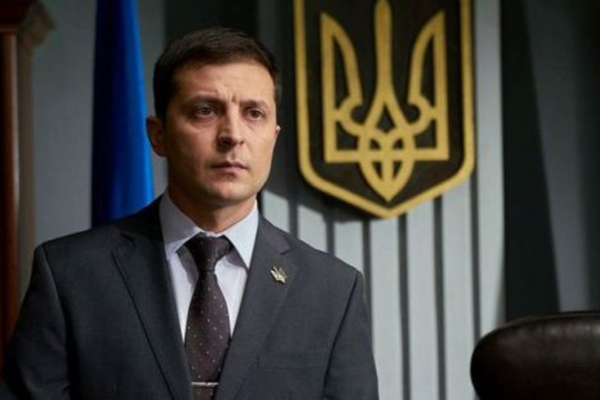February 01, 2019
Over the past three years, voters in every region of the world have turned to political candidates and parties that offer transformative change. The list includes Brazil's Bolsonaro, Mexico's Lopez Obrador, Italy's Five Star Movement and Lega, Pakistan's Imran Khan and, of course, Donald Trump.
As Ukraine moves toward presidential elections this spring, a similar wildcard figure has emerged. Meet Volodymyr Zelenskiy, a comic actor known to millions as the guy who plays Ukraine's president on television. Zelenskiy is now preparing a run for the real job, and outsiders better take him as seriously as his establishment rivals do.
Here's what you need to know:
The TV star: Zelenskiy became a TV star in Ukraine about 15 years ago. He has used his show "Evening Block" to mock politicians for many years. On a show called "Servant of the People," Zelenskiy played a school teacher who becomes Ukraine's president after his online tirade against corruption goes viral.
The man of the people: To separate himself from politicians he derides as pompous elites, Zelenskiy makes a point of never wearing a jacket. After announcing his candidacy, he pledged to hire a full team of campaign workers who have no political experience. He posts artfully amateurish videos of himself on his Facebook page talking about his hopes for Ukraine's future.
The nationalist?: Zelenskiy's supported the 2014 Maidan protests against Russian-backed Ukrainian President Viktor Yanukovych. After Russia invaded Crimea, Zelenskiy shut down his largest business in Russia and refused to perform there in the future.
The peacemaker?: He has pledged to solve problems based on public polling rather than his own convictions–and to sit down with Vladimir Putin to end the war in Ukraine's eastern provinces if voters told him to. This makes some in Ukraine, particularly the more anti-Russian western regions, nervous because Zelenskiy's first language is Russian and he still has business ties there. This leads some to suspect that Zelenskiy might sell out Ukrainian interests, especially because he has also expressed disdain for attempts to move Ukraine closer toward Europe.
The puppet?: Rivals have accused Zelenskiy of being the frontman for an exiled Ukrainian oligarch, Ihor Kolomoisky, who wants to avoid criminal charges of plundering the assets of a privatized bank. It remains unclear who'll pay for Zelenskiy's campaign.
The media man: Supporters and critics alike credit the on-camera experience and media savvy of Ronald Reagan and Donald Trump for much of their political success. Zelenskiy is likewise a master of media, and therefore a formidable opponent for establishment politicians. He's also using social media much more effectively and aggressively than his rivals.
The bottom line: Ukraine's conflict with Russia has essentially been frozen for the past several years, and its March election offers voters a chance to decide how they want their country to move forward. Zelenskiy has a legitimate outside shot at winning the presidential election, and his appeal for voters in pro-Russian regions means he's a candidate that outsiders—in Europe, Russia, and elsewhere—should be watching closely.
More For You
As expected, the Supreme Court struck down the bulk of Donald Trump's sweeping “Liberation Day” tariffs as illegal … and almost nothing changed.
Most Popular
What's Good Wednesdays
What’s Good Wednesdays™, February 25, 2026
Sponsored posts
Small businesses at a crossroads
Chris, an Army veteran, started his Walmart journey over 25 years ago as an hourly associate. Today, he manages a Distribution Center and serves as a mentor, helping others navigate their own paths to success. At Walmart, associates have the opportunity to take advantage of the pathways, perks, and pay that come with the job — with or without a college degree. In fact, more than 75% of Walmart management started as hourly associates. Learn more about how over 130,000 associates were promoted into roles of greater responsibility and higher pay in FY25.
Ukraine's President Volodymyr Zelenskiy, Finland's President Alexander Stubb, Estonia’s Prime Minister, President of the European Commission Ursula von der Leyen and other European leaders visit memorial to fallen Ukrainian defenders at the Independent Square on the fourth anniversary of Russia's full-scale invasion, in Kyiv, Ukraine February 24, 2026.
Ukrainian Presidential Press Service/Handout via REUTERS
Somewhere in the Donbas region, Ukrainian soldier Artem Bondarenko says he hasn’t slept through the night in months as he defends Eastern Ukraine.
- YouTube
In the latest episode of Vladimir Putin and Xi Jinping's hit wellness podcast This Authoritarian Life, we learn how positive communication patterns can break negative cycles in our relationships -- especially our relationships with Iran, Syria, Venezuela, and Cuba. #PUPPETREGIME
© 2025 GZERO Media. All Rights Reserved | A Eurasia Group media company.
